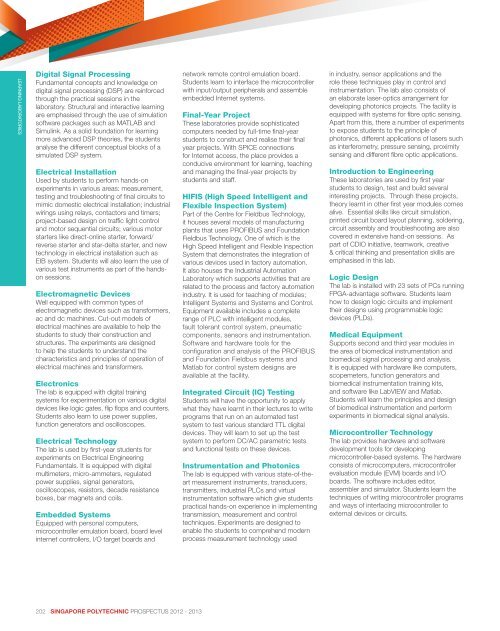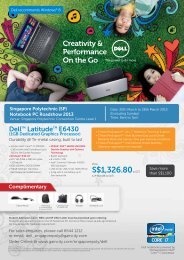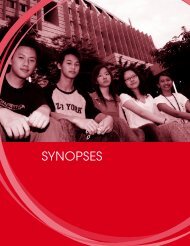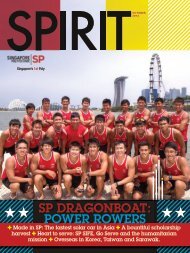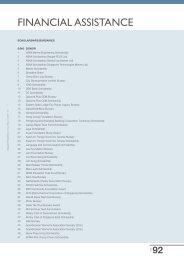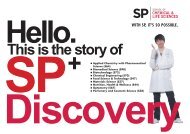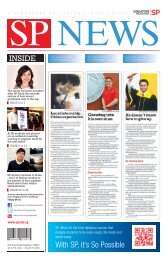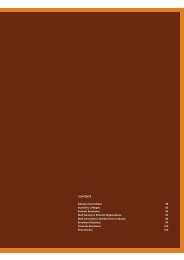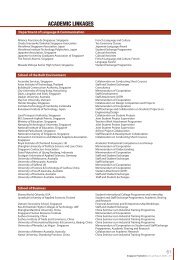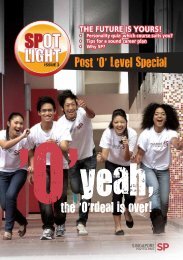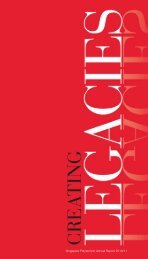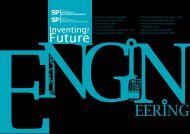Untitled - Singapore Polytechnic
Untitled - Singapore Polytechnic
Untitled - Singapore Polytechnic
- No tags were found...
Create successful ePaper yourself
Turn your PDF publications into a flip-book with our unique Google optimized e-Paper software.
Learning LABOrATOrIESDigital Signal ProcessingFundamental concepts and knowledge ondigital signal processing (DSP) are reinforcedthrough the practical sessions in thelaboratory. Structural and interactive learningare emphasised through the use of simulationsoftware packages such as MATLAB andSimulink. As a solid foundation for learningmore advanced DSP theories, the studentsanalyse the different conceptual blocks of asimulated DSP system.Electrical InstallationUsed by students to perform hands-onexperiments in various areas: measurement,testing and troubleshooting of final circuits tomimic domestic electrical installation; industrialwirings using relays, contactors and timers;project-based design on traffic light controland motor sequential circuits; various motorstarters like direct-online starter, forward/reverse starter and star-delta starter, and newtechnology in electrical installation such asEIB system. Students will also learn the use ofvarious test instruments as part of the handsonsessions.Electromagnetic DevicesWell equipped with common types ofelectromagnetic devices such as transformers,ac and dc machines. Cut-out models ofelectrical machines are available to help thestudents to study their construction andstructures. The experiments are designedto help the students to understand thecharacteristics and principles of operation ofelectrical machines and transformers.ElectronicsThe lab is equipped with digital trainingsystems for experimentation on various digitaldevices like logic gates, flip flops and counters.Students also learn to use power supplies,function generators and oscilloscopes.Electrical TechnologyThe lab is used by first-year students forexperiments on Electrical EngineeringFundamentals. It is equipped with digitalmultimeters, micro-ammeters, regulatedpower supplies, signal generators,oscilloscopes, resistors, decade resistanceboxes, bar magnets and coils.Embedded SystemsEquipped with personal computers,microcontroller emulation board, board levelinternet controllers, I/O target boards andnetwork remote control emulation board.Students learn to interface the microcontrollerwith input/output peripherals and assembleembedded Internet systems.Final-Year ProjectThese laboratories provide sophisticatedcomputers needed by full-time final-yearstudents to construct and realise their finalyear projects. With SPICE connectionsfor Internet access, the place provides aconducive environment for learning, teachingand managing the final-year projects bystudents and staff.HIFIS (High Speed Intelligent andFlexible Inspection System)Part of the Centre for Fieldbus Technology,it houses several models of manufacturingplants that uses PROFIBUS and FoundationFieldbus Technology. One of which is theHigh Speed Intelligent and Flexible InspectionSystem that demonstrates the integration ofvarious devices used in factory automation.It also houses the Industrial AutomationLaboratory which supports activities that arerelated to the process and factory automationindustry. It is used for teaching of modules;Intelligent Systems and Systems and Control.Equipment available includes a completerange of PLC with intelligent modules,fault tolerant control system, pneumaticcomponents, sensors and instrumentation.Software and hardware tools for theconfiguration and analysis of the PROFIBUSand Foundation Fieldbus systems andMatlab for control system designs areavailable at the facility.Integrated Circuit (IC) TestingStudents will have the opportunity to applywhat they have learnt in their lectures to writeprograms that run on an automated testsystem to test various standard TTL digitaldevices. They will learn to set up the testsystem to perform DC/AC parametric testsand functional tests on these devices.Instrumentation and PhotonicsThe lab is equipped with various state-of-theartmeasurement instruments, transducers,transmitters, industrial PLCs and virtualinstrumentation software which give studentspractical hands-on experience in implementingtransmission, measurement and controltechniques. Experiments are designed toenable the students to comprehend modernprocess measurement technology usedin industry, sensor applications and therole these techniques play in control andinstrumentation. The lab also consists ofan elaborate laser-optics arrangement fordeveloping photonics projects. The facility isequipped with systems for fibre optic sensing.Apart from this, there a number of experimentsto expose students to the principle ofphotonics, different applications of lasers suchas interferometry, pressure sensing, proximitysensing and different fibre optic applications.Introduction to EngineeringThese laboratories are used by first yearstudents to design, test and build severalinteresting projects. Through these projects,theory learnt in other first year modules comesalive. Essential skills like circuit simulation,printed circuit board layout planning, soldering,circuit assembly and troubleshooting are alsocovered in extensive hand-on sessions. Aspart of CDIO initiative, teamwork, creative& critical thinking and presentation skills areemphasised in this lab.Logic DesignThe lab is installed with 23 sets of PCs runningFPGA-advantage software. Students learnhow to design logic circuits and implementtheir designs using programmable logicdevices (PLDs).Medical EquipmentSupports second and third year modules inthe area of biomedical instrumentation andbiomedical signal processing and analysis.It is equipped with hardware like computers,scopemeters, function generators andbiomedical instrumentation training kits,and software like LabVIEW and Matlab.Students will learn the principles and designof biomedical instrumentation and performexperiments in biomedical signal analysis.Microcontroller TechnologyThe lab provides hardware and softwaredevelopment tools for developingmicrocontroller-based systems. The hardwareconsists of microcomputers, microcontrollerevaluation module (EVM) boards and I/Oboards. The software includes editor,assembler and simulator. Students learn thetechniques of writing microcontroller programsand ways of interfacing microcontroller toexternal devices or circuits.202 SINGAPORE POLYTECHNIC PROSPECTUS 2012 - 2013


